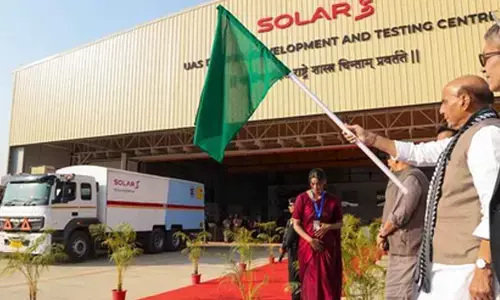Rumblings in Mideast

There are rumblings once again in the already volatile Middle East. The reverberations of the US intervention in Iraq are still being felt with hundreds of people killed daily in bomb blasts. The ‘Arab Spring’ which promised so much last year evaporated and Egypt was back to square one. It is possible that the much-hated former President Hosni Mubarak, sentenced to a life term, could be released and, who knows, may return to power! Anything is possible in the Middle East.
The pattern is sickeningly familiar: Threats, bullying, air strikes and finally invasion. False promises would be made that only military targets would be attacked, but then for the Western powers human life in other regions is of no value
There are rumblings once again in the already volatile Middle East. The reverberations of the US intervention in Iraq are still being felt with hundreds of people killed daily in bomb blasts. The ‘Arab Spring’ which promised so much last year evaporated and Egypt was back to square one. It is possible that the much-hated former President Hosni Mubarak, sentenced to a life term, could be released and, who knows, may return to power! Anything is possible in the Middle East.
And now, Syria, which along with Iraq, gave to the world two of the oldest civilizations, could descend to the worst kind of anarchy inviting foreign intervention, invasion and reckless bombing. Trouble had been brewing for several years and, unlike his father, the current President Bashar-al-Assad may not be able to stop the crisis getting out of hand. The latest crisis was over allegations (not proved) that Syrian armed forces had used chemical weapons in trying to subdue armed rebels aided by foreign mercenaries. These groups would not be satisfied with anything less than the ouster of Assad.

Alarmed at the charge of chemical weapons use , the ‘custodians’ of world democracy, the US and the UK, were preparing to invade Syria. At the time of writing UN Inspection teams had landed in Damascus to verify if Syria did in fact have sites to store chemical weapons. Assad who had consistently denied their existence had promised full co-operation. However , Western powers had been alleging that Syria did possess chemical weapons supplied by the Soviet Union, its long-time friend in the Arab world. Ever since civil disturbances broke out in Syria some five or six years back, Assad had been threatening he would not hesitate to use chemical weapons to subdue his enemies, who, he alleged, were being supported by the West and Israel.
In the turbulent Middle East, Saddam Hussein’s Iraq did use chemical weapons in its long war against Iran during the early 1980s. These were provided to Iraq by obliging friends in the West, including the US which regarded the Ayatollahs of Iran as the major threat to world peace. When the Western forces invaded Iraq on the pretext that it would use weapons of mass destruction (WMD) against the West which was determined to oust Saddam , the same UN Inspection teams visited Iraq and found no traces of these weapons.
By that time, urged by personal egos and simple blood thirstiness, George Bush and his lackey Tony Blair had already ordered the invasion. The embarrassment of not finding the WMD was covered up by bluff and bluster. Bush portrayed himself as the lone crusader against Islamic terrorism and managed to convince the gullible American people whose knowledge of world affairs did not extend beyond their native towns.
It is amazing that the so-called ‘leader of the free world’ had so quickly forgotten the lessons of Iraq and Vietnam. In the latter case, the US used huge quantities of the deadly Agent Orange to defoliate more than 20,000 sq.kms of forests, killing nearly 400,000 people and leaving 500,000 children with deadly effects of chemical weapons. Once again Washington shamelessly threatened Damascus with another invasion of the region without any definite proof of the use of chemical weapons. Britain’s Prime Minister David Cameron claimed that international sanction was not needed for invading Syria.
Granted, Assad did not qualify as an efficient practitioner of Western-type democracy. Like Saddam Hussein, he refused to be a stooge of Western powers . The Syrian unrest and violence had been going on for more than 5/6 years. How is it that Assad is still in power? Once a dictator is confronted with genuine people’s power, he is thrown out of power as it happened in the cases of Egypt’s Mubarak and Libya’s Gaddafi. Assad’s continued reign could be because he is still popular with sections of his people and also enjoys the solid support of the armed forces.
Look at Pakistan where democracy never settled down. The armed forces intervened only when the ‘democratically-elected’ ruler lost the confidence of the people. Perhaps, in Syria, the situation has not reached that stage. It would be a grave mistake to go by Western media reports which portray Assad as some kind of a monster. The same happened with Saddam Hussein and several other world leaders who had opposed the US.
The pattern is sickeningly familiar: Threats, bullying, air strikes and finally invasion. False promises would be made that only military targets would be attacked, but then for the Western powers human life in other regions is of no value. If thousands of innocent Syrian men, women and children died, it would not matter. A ‘dictator’ had been overthrown and the pride of Western-style democracy restored. The Arab world, mostly toadies of the West, would not come to the aid of their neighbour but rejoice at the fall of a powerful regional leader, as in the case of Saddam Hussein.














